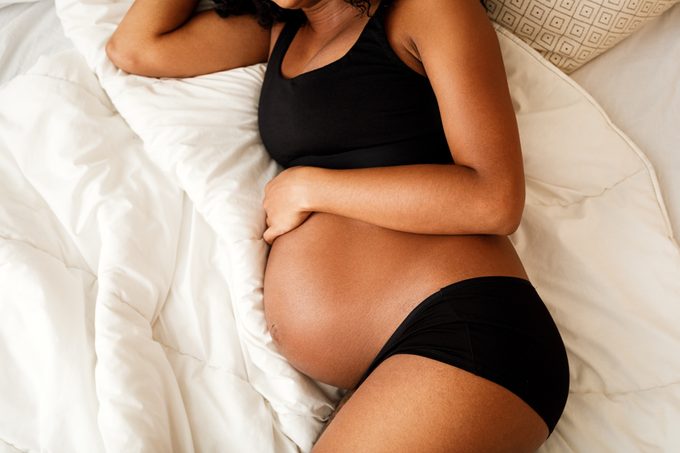What Is Lightning Crotch?
Updated: Sep. 01, 2022
That sudden shooting pain through your pelvis or vagina during pregnancy has a name: lightning crotch. Learn why it happens and what you can do about it.
Pain down there during pregnancy
Here’s a sentence I never thought I’d write: Actress Hilary Duff and I have something in common, and it has to do with our vaginas. It turns out we’ve both experienced what’s known as symphysis pubis dysfunction—colloquially, “lightning crotch“—which is a very specific and alarming type of pregnancy pain.
In an interview on The Ellen Degeneres Show, she described it as “stabbing pains in your vagina,” and I have to say that’s accurate.
“I texted my midwife the other day, and I was like, ‘What’s up with the stabbing pains in my vagina?’,” said Duff, 33, who at the time was pregnant with her third child. “It feels awful, like you’re being struck by lightning! And she just wrote back and she was like, ‘Oh, lightning crotch,’ like it was no big thing. And I was like, ‘This is quite traumatic.'”
Get The Healthy @Reader’s Digest newsletter
My personal experience with lightning crotch
I can vouch for this. Like Duff, I didn’t experience lightning crotch with my first few pregnancies; it was a special torture I experienced only with my last child. It came on suddenly, out of nowhere.
It would stop me in my tracks. Grocery shopping, taking care of my other kids, working—it didn’t matter what I was doing, I would have to immediately stop and hold my crotch, waiting for the knifelike pains to stop.
Sometimes they were brief. Other times, they lasted up to a minute. Occasionally, groaning or quiet swearing was involved. One time, it actually made me drop my then 2-year-old, and then there were two of us crying in pain.
Regardless of the circumstance, it was always surprising, always shockingly painful, and almost always embarrassing (because of all the involuntary crotch-grabbing, see).
“It’ll just strike all of a sudden, and you’re, like, doubled over, and then it’s gone,” Duff said, echoing the experience of many mothers.
Plus, it can be really scary. It isn’t discussed often, and sharp vaginal pains generally aren’t a good thing during pregnancy. Like Duff, I too called my doctor in a panic.
Thankfully, lightning crotch is quite normal and on its own isn’t harmful, says Gil Weiss, MD, a partner at the Association for Women’s Health Care and assistant professor of clinical medicine in the Department of Obstetrics and Gynecology at Northwestern Memorial Hospital in Chicago.
22 Myths Gynecologists Want You to Ignore
Symptoms of lightning crotch
If you’re experiencing lightning crotch, you’ll know. In the literal sense, it feels like lightning in your pelvic region. Most women report feeling a zip or zing that produces pain. This is especially true when you’re moving around or if you feel the baby move around. Fortunately, the pain will go away within a minute or so, but it can also come back sporadically during pregnancy.
How to Use a Pain Scale to Assess Your Pain

Causes of lightning crotch
“You can think of lightning crotch as pelvic girdle pain,” says Dr. Weiss. The pain is usually sharp and jabbing, lasting up to a minute. It’s typically localized to one spot, but it may radiate to your vagina and rectum. It tends to happen in the last half of the third trimester.
“No one knows exactly what causes it, but we assume that as the baby descends in your birth canal, nerves get compressed near your pubic bone and along the back of your pelvis. This compression causes the sharp, transient pain,” explains Dr. Weiss.
It’s important to know, though, that not all down-there pain during pregnancy is lightning crotch. Call your doctor if you experience any of the following symptoms, which may point to other, more serious issues:
- You are experiencing other types of pain.
- The pain is so disabling you can’t function in your daily life.
- The pains don’t stop, or they come very quickly together.
- The pain is accompanied by bleeding and/or cramping.
- Your water breaks.
- You have fever, chills, foul-smelling vaginal discharge, or other signs of an infection.
10 Things Never to Say to a Pregnant Woman
Triggers for lightning crotch
As both Duff and I can attest, lightning crotch can strike for any reason—or no reason at all. However, there are some things that are known to increase the chance your vagina will suddenly feel like it’s filled with bees:
- Changing position after a prolonged period of time
- Sitting for long periods of time
- Standing up suddenly
- Squatting deeply
- Picking up something heavy, like furniture
- The baby shifting positions
One common situation that may trigger lightning crotch is going to the bathroom in the middle of the night. As most pregnant women can attest, this happens too many times a night during the last trimester.
Peeing at Night? What Frequent Urination Says About Your Health
Women who have bigger babies, are carrying multiple babies or have a baby turned “sunny-side up” (babies that enter the birth canal facing upward, with their skull compressing the back of the pelvis) are at a higher risk for lightning crotch, says Dr. Weiss.
Treatment and prevention
It may not be entirely preventable, but there are some things you can do to reduce your risk, says Dr. Weiss.
- Change your position frequently throughout the day
- Take a 15-minute walk every few hours
- Stand up slowly
- Do gentle flexibility and strengthening exercises for your hips, legs, and back
- Wear a belly band or pregnancy support band to lessen pressure on your pelvis
- Get a prenatal massage
Since long stretches of sitting can trigger the pain, exercise is your friend. That’s right: you can safely exercise when you’re pregnant. The notion that you need to avoid activity is a pregnancy myth.
7 Ways to Prevent Birth Defects Before and During Pregnancy
The last word
Understanding what’s happening in your body and taking steps to prevent it can reduce the anxiety that comes with stabbing vaginal pains during pregnancy. If you still experience lightning crotch, take deep breaths. When all else fails, go ahead and grab your crotch to alleviate the pain. The feeling will pass.
Check out some of the other changes you might experience—like hair loss during pregnancy.
For more wellness updates, follow The Healthy on Facebook, Instagram, and Twitter. Keep reading:



















